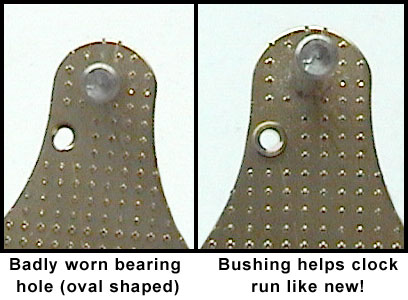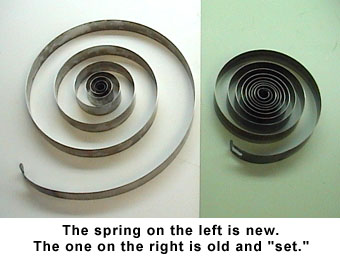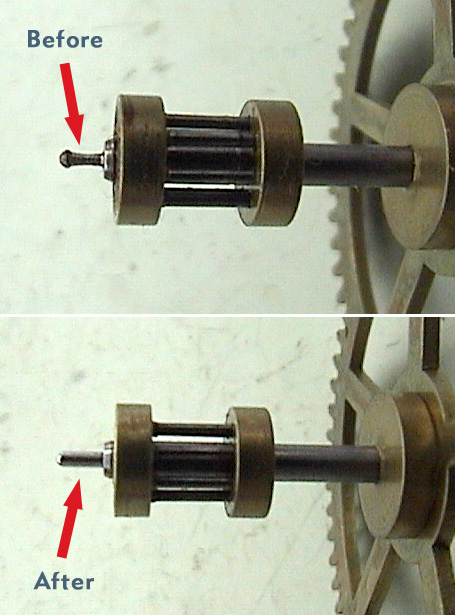

Our Services
We work on most kinds of mechanical clocks: mantel, wall, standing (grandfather), anniversary, and antique cuckoo. We work only on mechanical movements; we no longer provide replacements for modern battery movements or plug-in electric movements, nor do we service modern cuckoo clocks, or Korean-made 31-day movements.
Among the brands of clocks we repair are: Seth Thomas, Ansonia, Ingraham, Gilbert, New Haven, Kroeber, Jerome, Waterbury, Welch, Terry, Sessions, Enfield, Smiths, Dent, Junghans, Kienzle, Hamburg-American, Urgos, Hermle, Kieninger, Jauch, Howard Miller, Ridgeway, Colonial, Trend, Barwick, Emperor, Gustav Becker, Chelsea, Boston Clock Co., Japy, Mougin and many more.
To see some of the more extraordinary clocks we've worked on, visit our Special Clocks page!
We no longer offer watch repair or watch battery replacement.
Movement Overhaul
This is the most common service for a mechanical clock. The steps involved are:
- Remove the movement from the case
- Carefully examine the movement for excessive wear and other potential problems.
- Fully disassemble the movement.
- Completely clean the movement, including an ultrasonic bath.
- Examine and, if needed, polish all pivots and bearings.
- Reassemble and lubricate the movement with state-of-the-art lubricants.
- Adjust the movement for proper timekeeping (see "A Note About Accuracy" below).
Beware of repairmen who take shortcuts with these procedures. See "Service or Disservice?" for more information.
Grandfather clocks
For grandfather clocks (and other clocks too large or heavy to move), we come to your house, remove the movement, weights and pendulum, and bring them back to our shop for repairs. When completed, we return and re-install the movement. Beware of repairmen who say they can do a proper job of cleaning and oiling a movement in the home!
House calls do incur an additional charge.
Movement Repairs
As with any mechanical device, parts can break or become too worn for useful operation. Here are some common repairs:
|
 |
|
 |
|
|
|
|
Repair, Refurbishing, Restoration, and Conservancy of Antiques
There are several ways to take care of an antique clock.
- Repair implies simply fixing what’s wrong without significant intervention.
- Some collectors like to refurbish a clock, replacing a worn dial with a new one, replating metal pieces, putting new veneer on wooden cases.
- Restoration implies bringing a clock to as close to its original, but aged, state as possible. This might involve expert repainting of a dial or reverse-glass artwork, or careful treatment of an old, worn finish.
- Conservancy is maintaining the clock in as close to as-found, original condition, with minimal intervention, consisting typically of conservative maintenance of the finish, and as near to invisible movement repairs as possible.
Whatever the needs are for your clock’s maintenance, Prestige Clock Repair will be happy to advise you on the most suitable course of action.
A Note About Accuracy
In an age of Global Positioning Satellites broadcasting atomically accurate time, the variations in mechanical timekeeping can be surprising. Every effort is made to adjust your clock for its most accurate timekeeping over the course of its winding cycle (for example, daily or weekly). Many things can affect that adjustment once the clock is placed back in your home.
The most important of these in a pendulum-regulated clock is leveling. Your clock will be adjusted to run on a level surface. It will be “in beat,” meaning that the “tick” and “tock” will be evenly spaced. If your pendulum clock is not level at home, it will be out of beat and timekeeping will be affected.
Temperature can affect timing by lengthening or shortening the pendulum, or affecting the properties of balance springs.
In a spring driven clock, it is not uncommon for there to be variations in timekeeping. Over the course of the spring’s unwinding, the amount of power delivered to a movement can vary widely.
Nearly every clock has an easy way to adjust its timing. We will go over adjustment with you when the clock is delivered.
Prestige Clock Repair
Bluff Heights (near 4th and Junipero)
Long Beach, CA 90814
(714) 898-CLOCK
(898-2562)
Open by appointment only, Tuesday through Saturday.
Please call to arrange your appointment. Exact address
and directions will be provided during the appointment process.
DON'T LIVE IN SOUTHERN CALIFORNIA?
Check our recommendations here.



 Replacing
gear pivots – This is what happens when you wait too long
to have your clock serviced! The pivots are the small ends of
the gear shafts that spin inside the holes on the plates. When
abrasive dirt gets into those holes, and the clock is run for
years and years without service, the steel of the pivots can,
in some cases, be ground down so badly that the only remedy is
to replace the pivots. The pivot shown here was 0.031" in
diameter. Prestige Clock Repair intalled the replacement to help
this old clock run like new.
Replacing
gear pivots – This is what happens when you wait too long
to have your clock serviced! The pivots are the small ends of
the gear shafts that spin inside the holes on the plates. When
abrasive dirt gets into those holes, and the clock is run for
years and years without service, the steel of the pivots can,
in some cases, be ground down so badly that the only remedy is
to replace the pivots. The pivot shown here was 0.031" in
diameter. Prestige Clock Repair intalled the replacement to help
this old clock run like new.